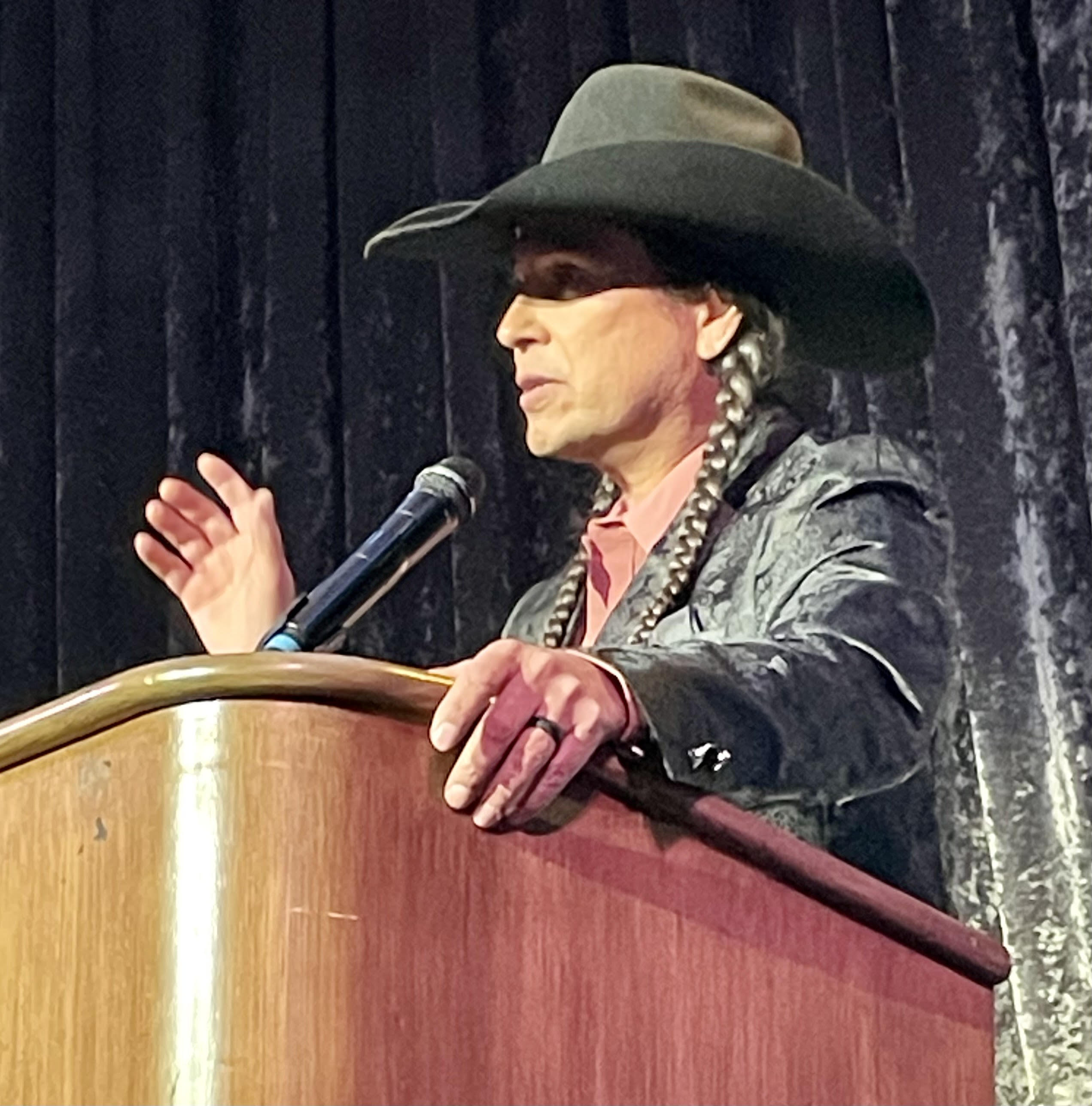
- Details
- By Levi Rickert
LAS VEGAS — Speaking before at the National Native American Human Resources Association's Gala at the Palms in Las Vegas, “Yellowstone” star Mo Brings Plenty (Lakota) spoke about the strength of unity.
Wearing his trademark black cowboy with black braids, he posed two questions: “What would happen if all our people came together, united?” and “What would the end result be?”
“The end result would be very positive. The end result would be cultural diversity in this country. The end result would be the end of racism,” Brings Plenty said.
Brings Plenty said people should concentrate on the positive side to diversity. He said the country needs to get to: “We the people.”
“We the People. It doesn't matter how dark or light, or what our hair looks like. We are all human beings at the end of the day,” Brings Plenty said.
“I know I said this before, but I’m really, really seriously thinking about it, because if Trump can be president, I know I can be. It’s not about me. It’s about us. It’s about you. It’s about Indian Country.”
It’s true, he did say it before.
Back in May 2022, Brings Plenty was on stage at the 2022 Reservation Economic Summit (RES) in Las Vegas being interviewed by Chris James, president and CEO of the National Center for American Enterprise Development.
James asked the popular actor what is next for him after Yellowstone.
“Yellowstone's going to be kind of hard, tough to top. But in the end, I do have an idea, and my idea has been a dream for a while. I think when the time is right, maybe I'll start pursuing it and make it a reality. And that is to be the next President of the United States.”
“There's no one saying that I can't do it other than myself and $20 million. I asked how I get my main foot in the hat for the presidency? An individual told me ‘Well, firstly, you’d have to raise $20 million.’ I said ‘Okay, I got a few good horses. I’ll campaign riding on horseback across the country.’ So, if you ever see me on horseback riding across the country, you know what's up,” Brings Plenty told James.
His answer pleased the audience that clapped and gave out some whooping sounds.
More Stories Like This
Native News Weekly (August 25, 2024): D.C. BriefsUS Presidents in Their Own Words Concerning American Indians
Oral History Project Announces 14th Stop in Portland, Oregon: NABS Continues to Gather Crucial Stories Across Indian Country
National Museum of the American Indian Closes Amid Federal Government Shutdown
Next on Native Bidaské: Indigenous Peoples' Day Should Be About Truth
Help us tell the stories that could save Native languages and food traditions
At a critical moment for Indian Country, Native News Online is embarking on our most ambitious reporting project yet: "Cultivating Culture," a three-year investigation into two forces shaping Native community survival—food sovereignty and language revitalization.
The devastating impact of COVID-19 accelerated the loss of Native elders and with them, irreplaceable cultural knowledge. Yet across tribal communities, innovative leaders are fighting back, reclaiming traditional food systems and breathing new life into Native languages. These aren't just cultural preservation efforts—they're powerful pathways to community health, healing, and resilience.
Our dedicated reporting team will spend three years documenting these stories through on-the-ground reporting in 18 tribal communities, producing over 200 in-depth stories, 18 podcast episodes, and multimedia content that amplifies Indigenous voices. We'll show policymakers, funders, and allies how cultural restoration directly impacts physical and mental wellness while celebrating successful models of sovereignty and self-determination.
This isn't corporate media parachuting into Indian Country for a quick story. This is sustained, relationship-based journalism by Native reporters who understand these communities. It's "Warrior Journalism"—fearless reporting that serves the 5.5 million readers who depend on us for news that mainstream media often ignores.
We need your help right now. While we've secured partial funding, we're still $450,000 short of our three-year budget. Our immediate goal is $25,000 this month to keep this critical work moving forward—funding reporter salaries, travel to remote communities, photography, and the deep reporting these stories deserve.
Every dollar directly supports Indigenous journalists telling Indigenous stories. Whether it's $5 or $50, your contribution ensures these vital narratives of resilience, innovation, and hope don't disappear into silence.
 The stakes couldn't be higher. Native languages are being lost at an alarming rate. Food insecurity plagues many tribal communities. But solutions are emerging, and these stories need to be told.
The stakes couldn't be higher. Native languages are being lost at an alarming rate. Food insecurity plagues many tribal communities. But solutions are emerging, and these stories need to be told.
Support independent Native journalism. Fund the stories that matter.
Levi Rickert (Potawatomi), Editor & Publisher

